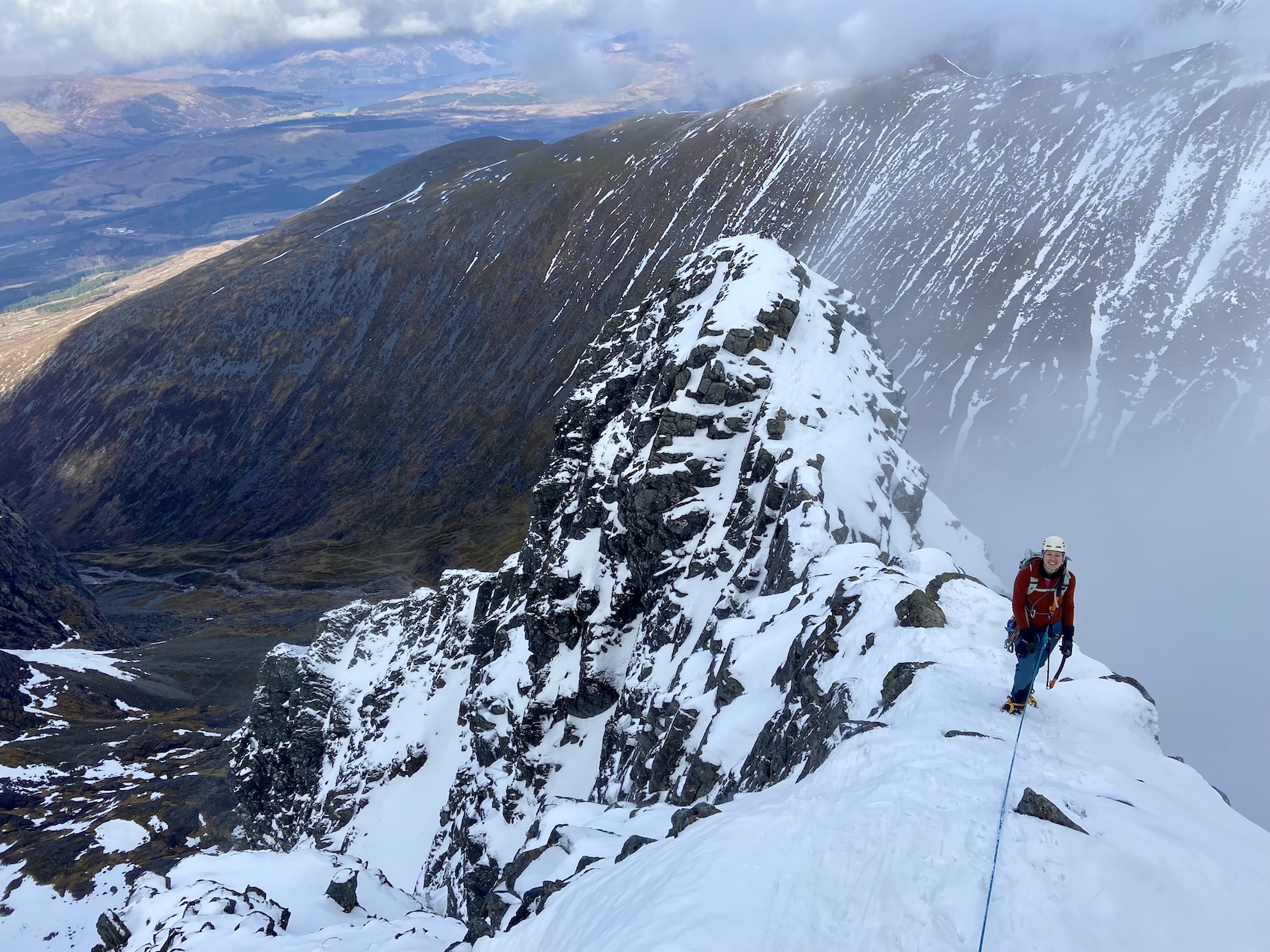
Scottish Winter Mountaineering
Skills Course
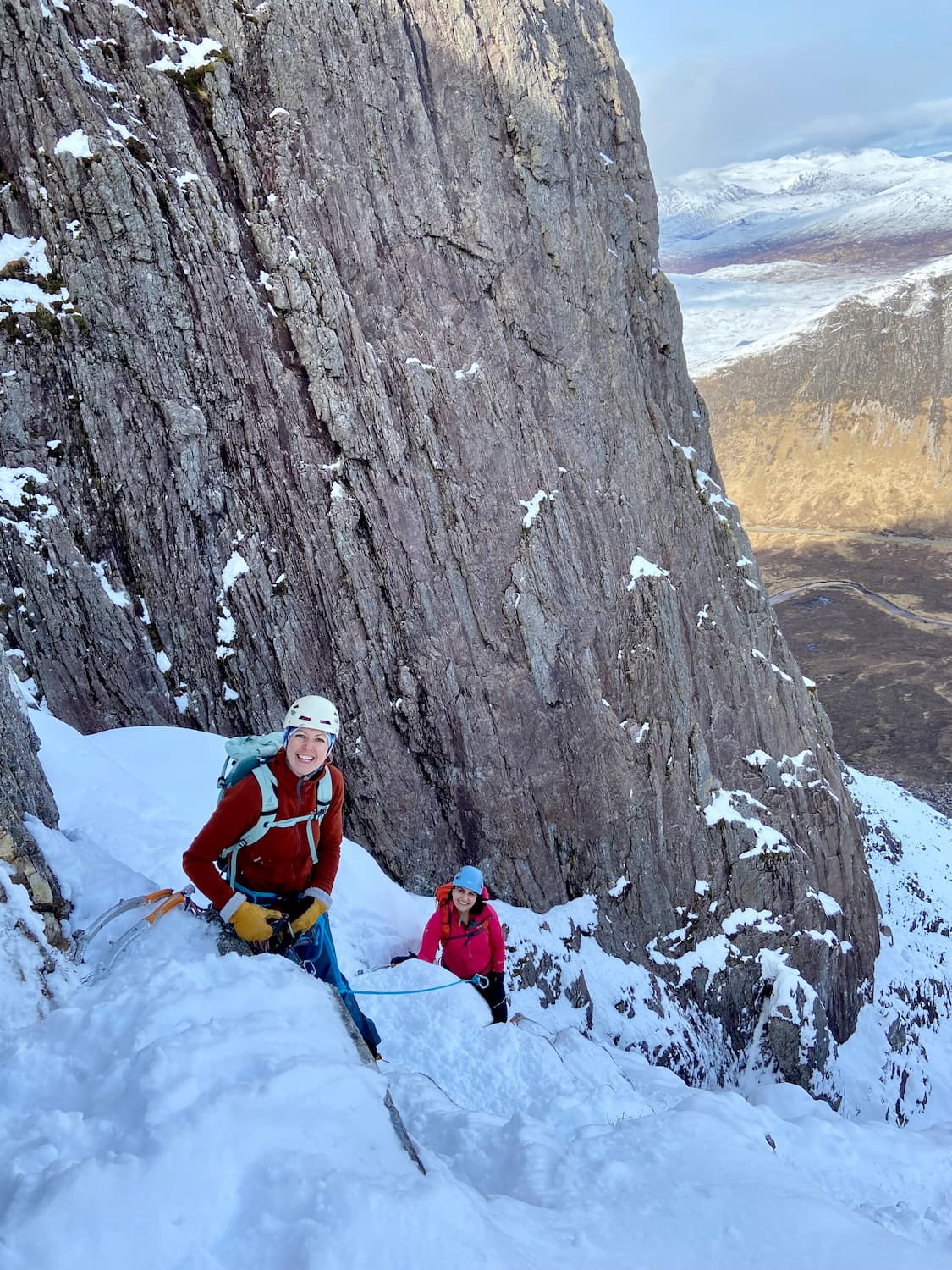
Winter Mountaineering Skills Course in Scotland
Take your Winter Walking to the next level with our Winter Mountaineering Skills Course in Scotland. This course builds on the basic winter skills and introduces more advanced rope work techniques, preparing you for tackling steeper and more challenging terrain. Whether you’re looking to refine your winter mountaineering skills or take on classic Scottish winter routes, we can tailor the course to your needs.
Our Winter Mountaineering Course is designed to give you the confidence and skills to safely navigate technical winter ground. The content will depend on your current skill level and the time you spend with us, but by the end of it, you’ll be ready to take on bigger challenges. If you’re new to the world of mountaineering, we recommend considering a summer rock climbing or scrambling course beforehand to ensure you’re fully prepared.
A good level of fitness is required for these days, as we’ll be covering some demanding and rewarding terrain.
What will you learn on our Scottish Winter Mountaineering skills course?
Throughout the course, we’ll focus on a range of important mountaineering skills, including:
- Ice-axe and crampon use – mastering these tools for different types of terrain
- Rope work – including techniques for leading, seconding, and setting up anchors
- Snow belays, Bucket seats, Bollards and more!
- Snow and avalanche awareness – recognising and managing risks in winter conditions
- Winter navigation – using map, compass, and GPS to navigate safely in winter environments
- Winter-specific risk management – including emergency procedures and survival skills
- Occasionally people are heading off on a bigger Alpine or Himalayan objective and like to looks at things such as taking coils, moving together, crevasse rescue or fixed line practice.
- Ascending lots of super fun mountains and routes!
With access to both low-level training venues and many mountains in the Ben Nevis and Glencoe areas, we’ll make the most of the snow and weather conditions to ensure you learn as much as possible in these stunning locations.
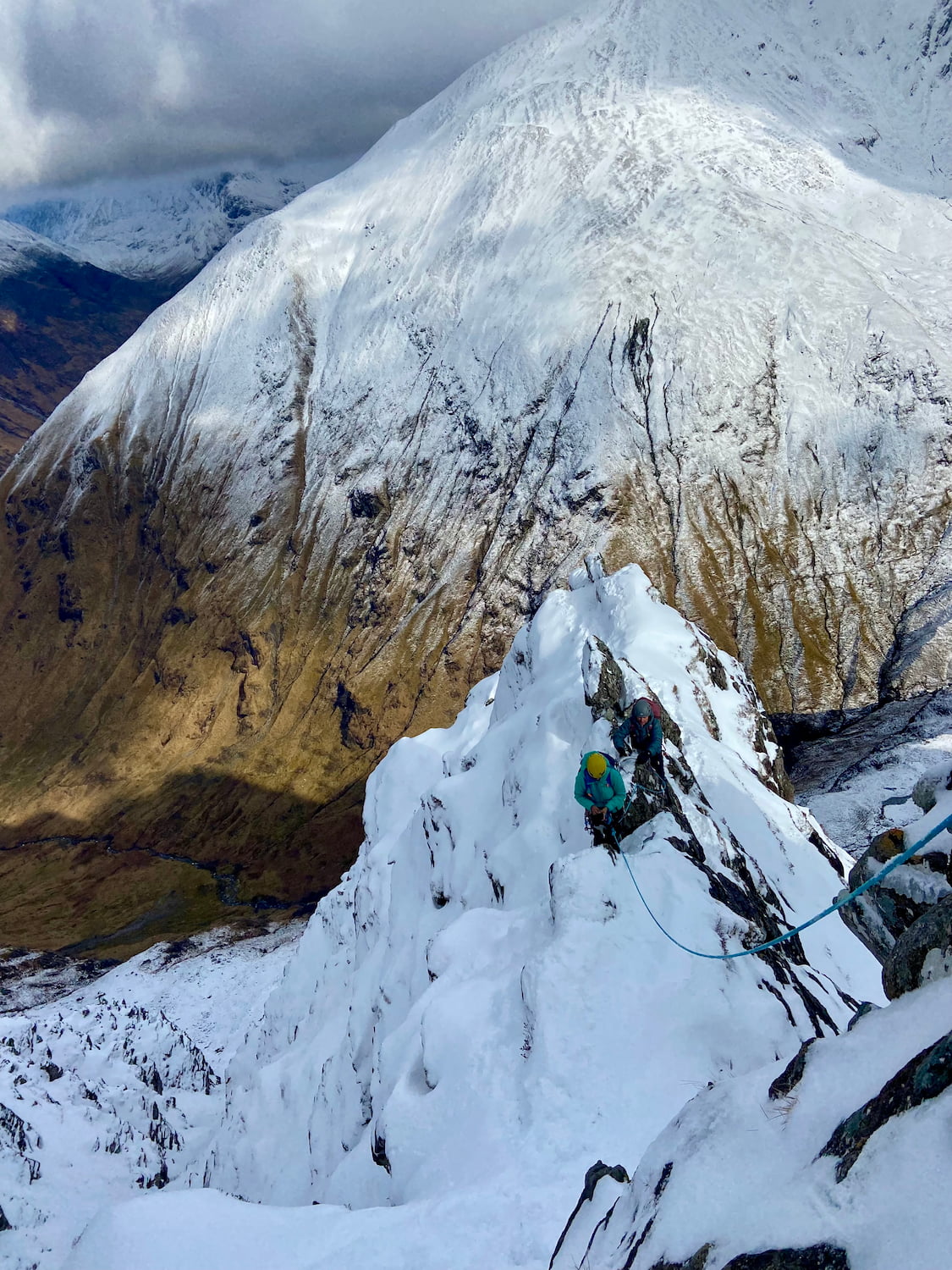
Why Choose Our Scottish Winter Mountaineering Skills Course?
Our courses are run by a highly qualified and experienced instructor with a deep passion for anything mountains. With decades of experience throughout the UK, Alps, Andes, US, African and Himalayan peaks both for personal fun and guiding – Stu really has been there and done it. He is also a trainer/assessor for the Mountain Leader and Rock Climbing qualifications, so you’re in safe, expert hands. Whether you’re aiming to undertake your first mountaineering route on your own, refine your technical skills, or prepare for bigger objectives, we tailor the course to suit your needs.
Stu holds the WMCI award, the highest UK qualification in climbing and mountaineering, Summer and Winter. He’s a full member of the Association of Mountaineering Instructors, and is a trainer/assessor for the Mountain Training NGB instructor qualifications.
Having been heading to Scotland for the Winter season for twenty years, we know all the best spots to get the most out of your time with us!
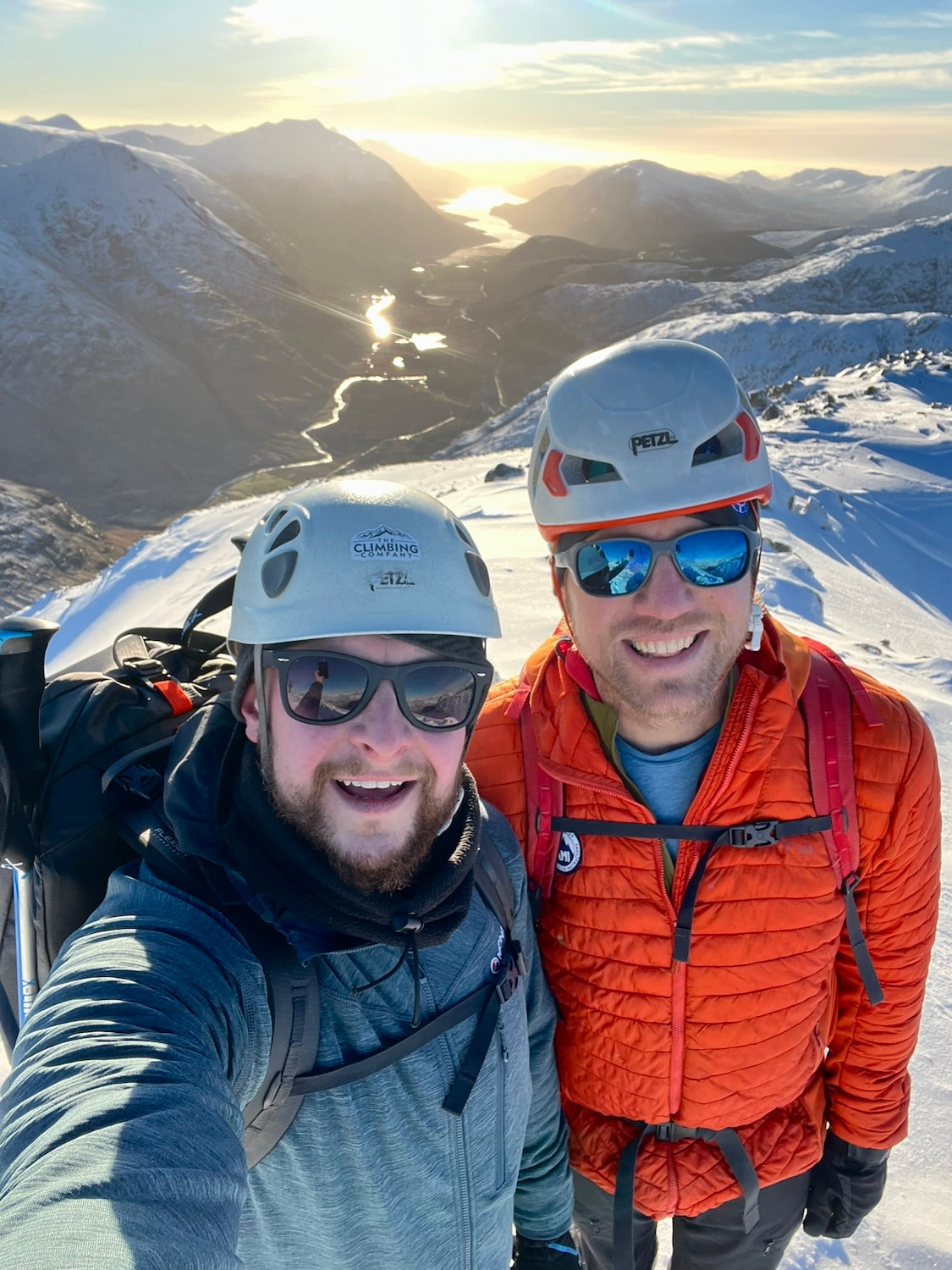
DATES, PRICES & BOOKING
Minimum participants 2
2 DAY COURSE – £300pp
3 DAY COURSE – £450pp
5 DAY COURSE – £750pp
Can’t quite find what you’re looking for or perhaps you’d rather alternative dates?
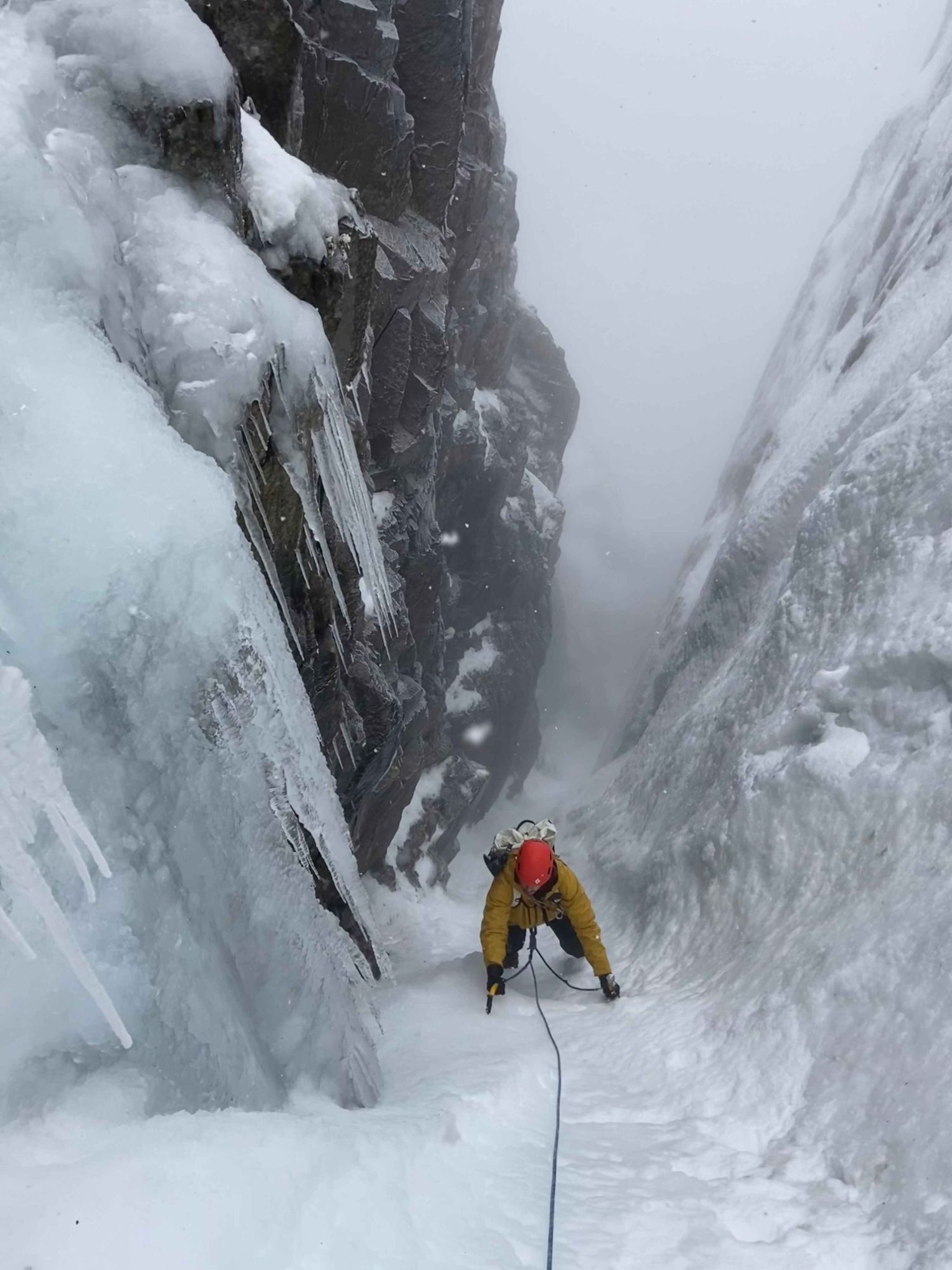
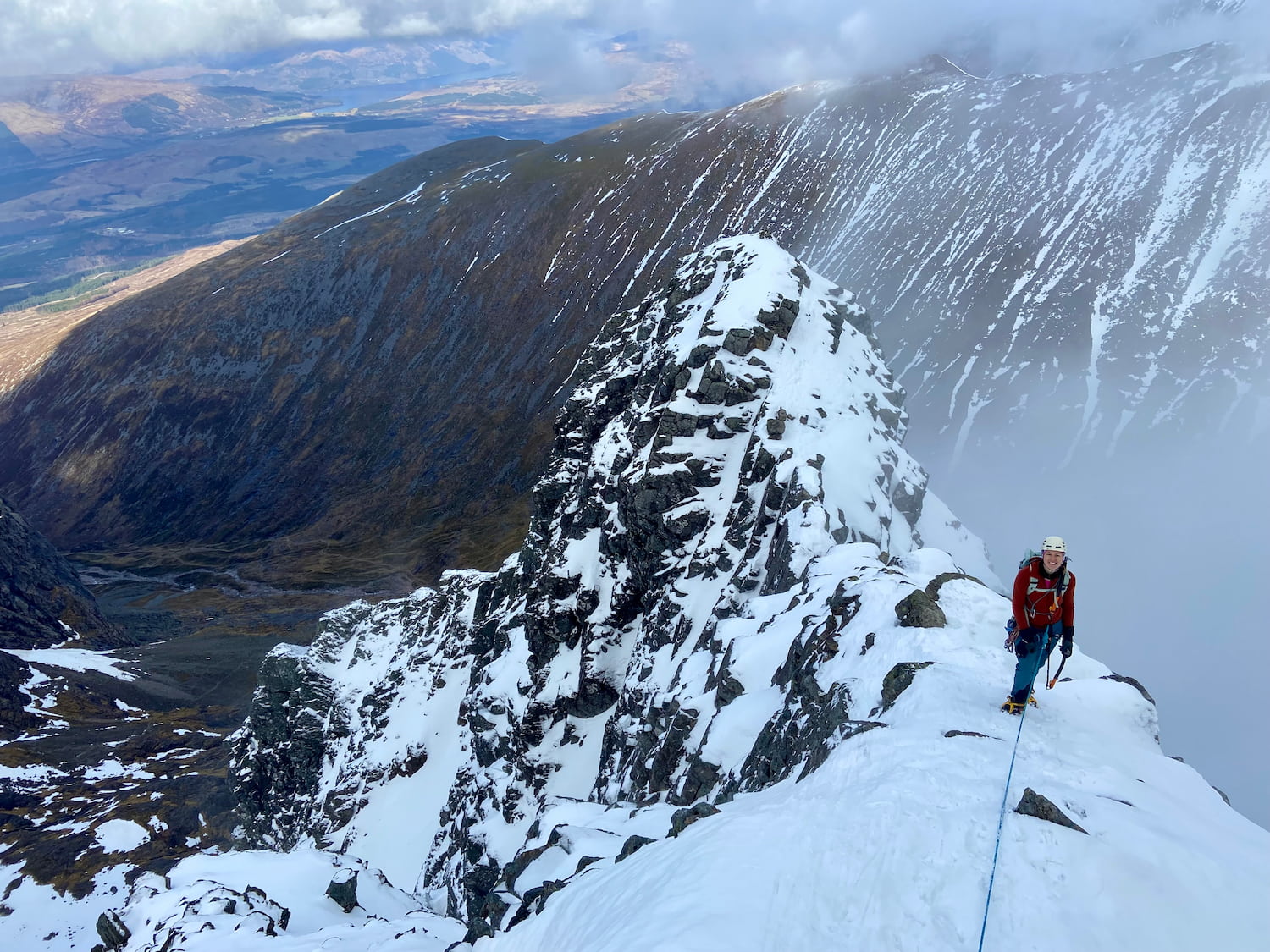
Do I need prior winter climbing or mountaineering experience to join the course?
No, you don’t need any prior winter climbing or mountaineering experience to join our Scottish Winter Climbing course. The course is perfect for those who are new to winter climbing or want to build on their existing skills. You will need to be a confident summer mountain walker and scrambler, and ideally some climbing experience. If you’re new to climbing we can arrange some prior learning.
What skills will I learn on the course?
On our Scottish Winter Climbing course, you’ll learn key skills to safely climb in winter conditions, including:
- Footwork and movement techniques on snow and ice
- How to use crampons and an ice axe effectively
- Basic winter climbing techniques, including placing protection and creating anchors
- Route planning, navigation, and risk management in winter weather
- Avalanche awareness and snow condition assessment
What equipment do I need to bring?
Please refer to the kit list below for full details on what you need to bring for your winter climbing course. If you’re unsure about any item, feel free to contact us, and we can help ensure you’re fully prepared.
What if the weather conditions are bad on the course dates?
Scottish mountain weather is known to be unpredictable, and safety is always our top priority. If conditions are unsafe (e.g., high winds or avalanche risk), we will adjust the course itinerary, change locations, or, if necessary, reschedule the course. We have some excellent low level teaching venues that work no matter the weather. We’ll keep you updated regularly and ensure that no matter the weather, we make the most of the experience. There’s always something constructive we can do, and the mountains are an exciting place to be in any conditions! Sadly the Ice Factor at Kinlochleven is still shut…
How long is the Scottish Winter Climbing course, and what do the days entail?
Our Scottish Winter Climbing course typically lasts between two and five days. Each day will be a blend of practical instruction and hands-on climbing in the mountains. We’ll meet each morning to discuss the day’s objectives, then head out and go climbing. Expect a mix of walking, climbing, and instruction, while we aim to complete exciting climbs and make the most of the conditions.
What level of fitness do I need for the course?
The course is suitable for those with a good level of fitness who are comfortable with hillwalking and have some climbing experience. Winter climbing can be more demanding, so you should be prepared for long days in the mountains, walking in snow and carrying extra weight due to winter gear. If you’re unsure about your fitness level or experience, feel free to get in touch, and we can help assess whether the course is right for you.
Can I hire equipment for the course?
Yes, we offer the option to hire essential winter climbing gear, including crampons, helmets, ice axes, and climbing harnesses for an additional charge. However, you’ll need to bring your own winter boots (which can also be hired externally) and appropriate clothing (warm layers, waterproofs, etc.). If you’re unsure about what equipment you need, don’t hesitate to get in touch, and we’ll help you arrange the correct kit for your course.
Is transport and accommodation provided?
Transport and accommodation are not included. On day one, we will meet at a café or similar location to check your kit and plan the day. From there, we’ll head to the climbing venue. If you’re staying in Fort William, we may be able to offer a lift. On subsequent days, we typically meet near the venue for the day’s activities.
How to get to Fort William?
Scotland is quite a journey from many parts of the UK, especially for a weekend! You’ll need to factor this into your travel arrangements and time off. Fort William has both rail and bus stations. The nearest airports are Glasgow and Inverness. While it is possible to hire cars from either, Glasgow has better public transport options: There are three direct trains per day, with a journey time of nearly four hours, and CityLink offers six direct buses a day, with a journey time of just over three hours. If coming from the south-east, there is the popular overnight train originating in London.
Essential Climbing and Winter Gear
- Rucksack (35-45L)
A simple, rugged design (avoid airflow system backs). - Winter Boots (B2 rated minimum, B3 for climbing courses)
Make sure they fit well before the course! Available for hire. - Crampons (C2 rating, e.g., Grivel G12)
These should fit your boots properly. For climbing courses, we may suggest more aggressive front points, such as the G14s. Available for hire. - Ice Axes (T-rated shaft, approx. 55cm for mountaineering)
A single axe for mountaineering or a pair of climbing axes (with clipper leashes) for climbing courses. Available for hire. - Climbing Helmet
Make sure it fits comfortably with your hat underneath. Available for hire. - Climbing Harness
Essential for climbing courses, not needed for Winter Skills; check that all your clothing fits comfortably under it. Available for hire. - Goggles – Anti-fog, double-lens design. Avoid overly dark lenses. Available for hire.
- Belay Plate & carabiner
- 2D shape screwgate carabiner
- 1 HMS screwgate carabiner
- 2 120cm Dyneema slings & snap gates
Clothing and Layering (Choose the best quality that fits your needs)
- Socks
Whatever works for you, but avoid cotton. If new to winter boots, carry blister plasters or zinc oxide tape in your first aid kit. - Gaiters
To keep snow out of your boots. Alternatively, waterproof trousers with integrated gaiters are a good option. - Base Layer Tops
Thermal and wicking materials. Consider both short- and long-sleeve options. - Trousers
A base layer and a regular pair of walking trousers work best. Softshell is a great choice, but whatever suits you under waterproofs. - Fleece Tops
One thin and one thicker fleece. Softshell is good for one layer, and a hood is a great addition. - Insulated Jacket
Go for synthetic (NOT down) with a loose fit that allows layering. - Waterproof Top
A sturdy jacket with a helmet-compatible hood and good chest pockets that fit a map. - Waterproof Bottoms
Choose durable trousers with full-length zips and braces for comfort. - Hat
No bobble hats; choose a style that fits under your helmet. A buff can be useful for face protection. - Gloves
A thin dexterous pair for general use, and a couple of waterproof, warm pairs (ideally with leather palms). Gloves (and hands!) will get wet in Scottish winter conditions!
Additional Gear
- Waterproof Case/Bag
For your phone, wallet, and keys. - Waterproof Bag for inside your Rucksack
To keep all your gear dry. - Headtorch
Plus spare batteries. We recommend bringing two torches; it’s easier to swap torches than change batteries in a storm. - Sunglasses & Sunscreen
Yes, even in winter! The sun can still be strong at higher altitudes. - Water Bottle/Flask
1L Nalgene and/or a small insulated flask is ideal. Avoid platypus-style bottles as they freeze easily. Top tip: hydrate well the night before and drink in the morning to reduce your load. - Compass
Silva Type 4 or similar. Always good to have a spare – we’ll bring extras. - Maps
Waterproof maps or with a case. We will advise you on specific areas. We’ll have spare maps on the day. - Watch
A stopwatch is essential for navigation and to ensure we finish in time for tea and cake! - Walking Poles with Snow Baskets
A great help when wading through snow and icy terrain.
Additional Safety Items
(Required for your own safety; we’ll have these, but if you’re out on your own, you must carry them)
- Survival Bag
A Blizzard Bag (NOT a survival blanket). - Group Shelter
A Bothy Bag for group use. - Small First Aid Kit
Include any personal medications you might need.
If you’re unsure about anything on the list or need assistance with hiring gear, just get in touch, and we’ll help guide you through what’s necessary for your Scottish Winter Skills course. We want you to feel confident, prepared, and ready to take on the mountains!
If you have any other questions or need help with your booking, don’t hesitate to get in touch with us. We’re here to help and make sure you’re well prepared for your winter climbing adventure!

